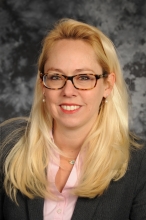CBE Seminar: Transient Kinetics - Addressing How Complex Surfaces Control Reaction Networks One Pulse at a Time

Senior Research Scientist
Idaho National Laboratory
Non-UCI persons, please use this registration link: https://forms.gle/JYmmZ8YhXpgw5oRv6
Abstract: The tools and methodology of ultra-high vacuum surface science offer precise measurement of heats of adsorption, rates of simple reaction steps and details of reaction mechanism on well-defined surface facets. As such, these measurement on model systems are readily amenable to validation from theoretical prediction. In the application environment, whether heterogeneous catalyst, adsorbent, membrane or electrode, multicomponent mixed metal oxides are primarily used, which present complexity that can be difficult to address through traditional surface science measurements and atomistic modeling. The Temporal Analysis of Products (TAP) methodology is a surface science variant that directly addresses the complex material: a catalyst taken from an industrial reactor; a charged cathode removed from an electrochemical cell. The TAP pulse response technique will be presented along with methods for measurement of intrinsic rate coefficients as they change with surface coverage on distinct time scales. Recent results that address critical reaction intermediates and kinetic steps for catalytic ammonia synthesis and oxidative coupling of methane will be presented. These process chemistries are pressure driven, but by using carefully designed isotopic pulsing experiments, the complex catalyst can be addressed in the low-pressure, surface science regime.
Bio: Rebecca Fushimi is a research scientist working in the emerging areas of dynamic catalyst science and flexible chemical manufacturing. Her research is focused on using and developing transient kinetic tools, where dynamics in chemical systems can reveal reaction networks and mechanism. She is an expert in the TAP (Temporal Analysis of Products) technique. Using TAP and other dynamic techniques, her research group investigates selective oxidation, dehydrogenation, selective hydrogenation, ammonia synthesis, and other reactions on supported metals and mixed metal oxide catalysts. These experiments provide fundamental information for the development of advanced materials that can reduce the energy intensity of chemical manufacturing.
Host: Professor Robert Nielsen
Share
Upcoming Events
-
MSE 298 Seminar: Radiation Resistance and Mechanical Response of Ceramics in Extreme Environments
-
MAE 298 SEMINAR: Stretchable Electronics for Soft Biological and Robotic Systems
-
CBE Distinguished Lecture/CBE 298 Seminar: Computational Design of Peptides as Detectors, Sensors and Drugs
-
MSE 298 Seminar: Molecular Modeling in the Age of AI - From Energy Materials to Device Simulations
-
Metal Electrodeposition for Modern Mineral Refining
